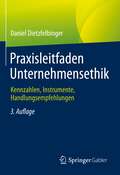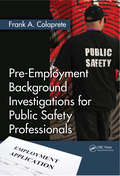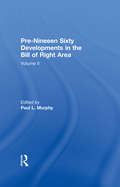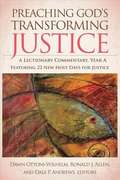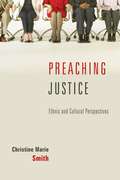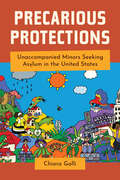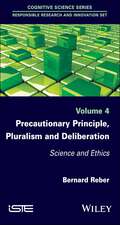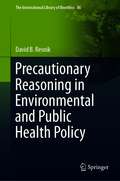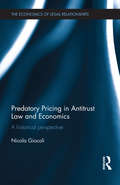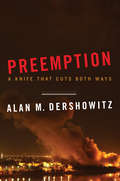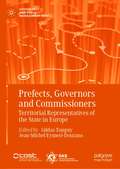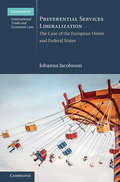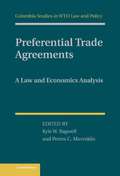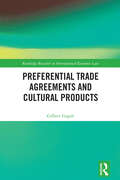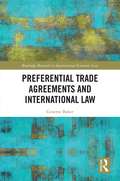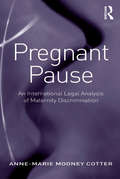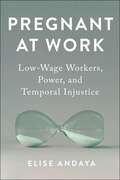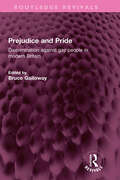- Table View
- List View
Praxisleitfaden Unternehmensethik: Kennzahlen, Instrumente, Handlungsempfehlungen
by Daniel DietzfelbingerUnternehmens- und wirtschaftsethische Fragen entscheiden zunehmend über Erfolg oder Misserfolg von Unternehmen. Welche Leitbilder, Haltungen und Kulturen gibt es, welchen Einfluss haben Moralvorstellungen von Führungspersönlichkeiten und der Charakter der Organisation auf Managementprozesse von Unternehmen und Organisationen?Die Wirtschaft und ihre Akteur*innen sehen sich drängenden Fragen der Gesellschaft gegenüber: Die Gesellschaft akzeptiert es längst nicht mehr, dass Wirtschaften im Verborgenen und zum Wohl einzelner Personen stattfindet. Die zunehmende Ablehnung der Privatisierung der Gewinne bei gleichzeitiger Sozialisierung der Schäden fordert Führungspersönlichkeiten und Organisationen heraus, sich unternehmens- und wirtschaftsethischen Fragen zu stellen und darauf befriedigende Antworten zu geben. Es geht um Fragen der individuellen Haltung von Verantwortlichen, um die Kultur von Organisationen sowie um die Gestaltung der großen umwelt- und wirtschaftspolitischen Fragen.Der Autor erläutert in diesem Praxisleitfaden, der nun bereits in der 3., überarbeiteten und aktualisierten Auflage vorliegt, die vermeintlichen Geheimnisse der Ethik und deren Relevanz für Einzelne wie für Organisationen. Die Leser*innen erfahren anhand von Praxisbeispielen, dass ethische Fragen im unternehmerischen Alltag ständig präsent sind. Der Autor zeigt, wie unternehmensethische Konzepte in strategische Managementprozesse einfließen und so zum Erfolgsfaktor werden können.
Praxisleitfaden für Führungskräfte im öffentlichen Dienst: Den Führungsalltag erfolgreich gestalten
by Kristof Tobias GermerDieses Buch vermittelt Führungskräften in der öffentlichen Verwaltung einen praxisorientierten Blickwinkel auf die Gestaltungsmöglichkeiten der täglich anfallenden Aufgaben in den Bereichen Führung und Management. Das Buch bündelt und vertieft dazu auf praxisnahe Weise Hintergrundwissen und hält Tipps für die praktische Anwendung bereit. Die Vermittlung von theoretisch fundiertem Basiswissen wird mit relevanten Praxisempfehlungen verbunden, wodurch im tagtäglich wahrgenommenen Aufgabenportfolio von Führungskräften im öffentlichen Dienst erfolgversprechender Mehrwert ermöglicht wird.Das Buch unterstützt Führungskräfte im öffentlichen Sektor dabei, das Thema Führung und Management für ihren zeitlich eng bemessenen praktischen Arbeitsalltag pragmatisch und anwendungsorientiert zu erfassen und vermittelt zeitgleich präzises Wissen, um den Führungskräftealltag erfolgreicher zu gestalten. Neben der Darstellung wesentlicher Führungs- und Managementaspekte des Führungskräftealltages und den damit verbundenen Aufgaben sowie ihrer Einordnung in einen praxisverständlichen theoretischen Hintergrund, schließt jedes Kapitel dieses Buches mit einer Auswahl essenzieller Instrumente und Methoden sowie nützlichen Praxistipps. Das Werk kann dank seiner überschaubaren und praxisorientierten Darstellung als alltagsbegleitendes Handbuch jederzeit kurzfristig zu Rate gezogen werden.
Pre-Employment Background Investigations for Public Safety Professionals
by Frank A. Colaprete***Author Radio InterviewJoin Dr. Frank A. Colaprete for an upcoming interview on the Privacy Piracy show on KUCI 88.9FM. Click here on September 2nd, 2013 at 8:00 a.m. PST to listen in.Pre-employment investigations have been the subject of intense review and debate since 9/11 made the vetting of applicants a critical function of every organization
Pre-Nineteen Sixty Developments in the Bill of Rights Area
by Paul L. MurphyVolume 2 in the 20-volume series reproducing over 300 key articles which explore the 200-year history of the rights of American citizens. This title contains 23 essays on development of the Bill of Rights from a range of academic authors; features some work found in previously published journals. Such a collection will prove insightful for historians, students of American history and those with a vested interest in historic American law.
Preaching God's Transforming Justice
by Ronald J. Allen Dale P. Andrews Dawn Ottoni-WilhelmThis unique commentary is the first to help the preacher identify and reflect theologically and ethically on the social implications of the biblical readings in the Revised Common Lectionary. In addition to providing commentary for each day in the lectionary calendar, this series introduces twenty-two Holy Days for Justice. These days are intended to enlarge the church's awareness of God's call for justice and of the many ways that call comes to the church and world today. The days include Martin Luther King Jr. Day, Earth Day, World AIDS Day, International Women's Day, Cesar Chavez Day, Yom HaShoah, and Juneteenth. For each of the lectionary days and Holy Days for Justice there is an essay that helps the preacher integrate a variety of social justice concerns (including racial/ethnic issues, sexism, classism, ecology, and violence) into their preaching. The contributors are a diverse group of homileticians, pastors, biblical scholars, theologians, and social activists.
Preaching Justice: Ethnic and Cultural Perspectives
by Christine Marie SmithPreaching Justice brings together eight very diverse voices from eight distinct cultural/ethnic communities, challenging them to articulate the specific justice concerns, issues, and passions that give rise to a preaching ministry within the their own community and beyond. Theological analyses are offered by theses persons representing their particular communities: Kathy Black - persons with disabilities Martin Brokenieg - Native Americans Teresa Fry Brown - African Americans Eleazar Fernandez - Filipino Americans Justo Gonzalez - Hispanics Eunjoo Mary Kim - Korean Americans Stacy Offner - Jews Christine Marie Smith - lesbians and gays This volume offers a rare vision of what transforms preaching might sound and look like, and urges that all preaching - whatever community it comes from, whatever community it hopes to reach - be grounded in the sacred acts of listening and knowing. Christine Marie Smith is professor of preaching and worship at United Theological Seminary of the Twin Cities, New Brighton, Minnesota. Her Previous books include Weaving a Sermon and Preaching as Weeping, Confession, and Resistance.
Precarious Protections: Unaccompanied Minors Seeking Asylum in the United States
by Chiara GalliMore children than ever are crossing international borders alone to seek asylum worldwide. In the past decade, over a half million children have fled from Central America to the United States, seeking safety and a chance to continue lives halted by violence. Yet upon their arrival, they fail to find the protection that our laws promise, based on the broadly shared belief that children should be safeguarded. A meticulously researched ethnography, Precarious Protections chronicles the experiences and perspectives of Central American unaccompanied minors and their immigration attorneys as they pursue applications for refugee status in the US asylum process. Chiara Galli debunks assumptions about asylum, including the idea that people are being denied protection because they file bogus claims. In practice, the United States interprets asylum law far more narrowly than what is necessary to recognize real-world experiences of escape from life-threatening violence. This is especially true for children from Central America. Galli reveals the formidable challenges of lawyering with children and exposes the human toll of the US immigration bureaucracy.
Precautionary Principle, Pluralism and Deliberation: Science and Ethics
by Bernard ReberThis volume tackles the burden of judgment and the challenges of ethical disagreements, organizes the cohabitation of scientific and ethical argumentations in such a way they find their appropriate place in the political decision. It imagines several forms of agreements and open ways of conflicts resolution very different compared with ones of the majority of political philosophers and political scientists that are macro-social and general. It offers an original contribution to a scrutinized interpretation of the precautionary principle, as structuring the decision in interdisciplinary contexts, to make sure to arrive this time to the "Best of the Worlds".
Precautionary Reasoning in Environmental and Public Health Policy (The International Library of Bioethics #86)
by David B. ResnikThis book fills a gap in the literature on the Precautionary Principle by placing the principle within the wider context of precautionary reasoning and uses philosophical arguments and case studies to demonstrate when it does—and does not—apply. The book invites the reader to take a step back from the controversy surrounding the Precautionary Principle and consider the overarching rationales for responding to threats to the environment or public health. It provides practical guidance and probing insight for the intended audience, including scholars, students, journalists, and policymakers.
Precedents and Case-Based Reasoning in the European Court of Justice
by Marc JacobPast cases are the European Court of Justice's most prominent tool in making and justifying the rulings and decisions which affect the everyday lives of more than half a billion people. Marc Jacob's detailed analysis of the use of precedents and case-based reasoning in the Court uses methods such as doctrinal scholarship, empirical research, institutional analysis, comparative law and legal theory in order to unravel and critique the how and why of the Court's precedent technique. In doing so, he moves the wider debate beyond received 'common law' versus 'civil law' figments and 'Eurosceptic' versus 'Euromantic' battle lines, and also provides a useful blueprint for assessing and comparing the case law practices of other dispute resolution bodies.
Precision Oncology and Cancer Biomarkers: Issues at Stake and Matters of Concern (Human Perspectives in Health Sciences and Technology #5)
by Roger Strand Anne BremerThis open access book reflects on matters of social and ethical concern raised in the daily practices of those working in and around precision oncology. Each chapter addresses the experiences, concerns and issues at stake for people who work in settings where precision oncology is practiced, enacted, imagined or discussed. It subsequently discusses and analyses bioethical dilemmas, scientific challenges and economic trade-offs, the need for new policies, further technological innovation, social work, as well as phenomenological research. This volume takes a broad actor-centred perspective as, whenever cancer is present, the range of actors with issues at stake appears almost unlimited. This perspective and approach opens up the possibility for further in-depth and diverse questions, posed by the actors themselves, such as: How are cancer researchers navigating biological uncertainties? How do clinicians and policy-makers address ethical dilemmas around prioritisation of care? What are the patients’ experiences with, and hopes for, precision oncology? How do policy-makers and entrepreneurs envisage precision oncology? These questions are of great interest to a broad audience, including cancer researchers, oncologists, policy-makers, medical ethicists and philosophers, social scientists, patients and health economists.
Preclassical Conflict of Laws (Cambridge Studies in International and Comparative Law)
by Nikitas E. HatzimihailTo better appreciate present-day private international law and its future prospects and challenges, we should consider the history and historiography of the field. This book offers an original approach to the study of conflict of laws and legal history that exposes doctrinal lawyers to historical context, and legal historians to the intricacies of legal doctrine. The analysis is based on an in-depth examination of Medieval and Early Modern conflict of laws, focusing on the classic texts of Bartolus and Huber. Combining theoretical insights, textual analysis and historical perspectives, the author presents the preclassical conflict of laws as a rich world of doctrines and policies, theory and practice, context and continuity. This book challenges preconceptions and serves as an advanced introduction which illustrates the relevance of history in commanding private international law, while aspiring to make private international law relevant for history.
Predatory Pricing in Antitrust Law and Economics: A Historical Perspective (The Economics of Legal Relationships)
by Nicola GiocoliCan a price ever be too low? Can competition ever be ruinous? Questions like these have always accompanied American antitrust law. They testify to the difficulty of antitrust enforcement, of protecting competition without protecting competitors. As the business practice that most directly raises these kinds of questions, predatory pricing is at the core of antitrust debates. The history of its law and economics offers a privileged standpoint for assessing the broader development of antitrust, its past, present and future. In contrast to existing literature, this book adopts the perspective of the history of economic thought to tell this history, covering a period from the late 1880s to present times. The image of a big firm, such as Rockefeller’s Standard Oil or Duke’s American Tobacco, crushing its small rivals by underselling them is iconic in American antitrust culture. It is no surprise that the most brilliant legal and economic minds of the last 130 years have been engaged in solving the predatory pricing puzzle. The book shows economic theories that build rigorous stories explaining when predatory pricing may be rational, what welfare harm it may cause and how the law may fight it. Among these narratives, a special place belongs to the Chicago story, according to which predatory pricing is never profitable and every low price is always a good price.
Predict and Surveil: Data, Discretion, and the Future of Policing
by Sarah BrayneThe scope of criminal justice surveillance has expanded rapidly in recent decades. At the same time, the use of big data has spread across a range of fields, including finance, politics, healthcare, and marketing. While law enforcement's use of big data is hotly contested, very little is known about how the police actually use it in daily operations and with what consequences.
Preemption: A Knife That Cuts Both Ways (Issues of Our Time)
by Alan M. Dershowitz"A path-breaking must-read for government leaders, strategists, and all concerned Americans."--General Wesley K. Clark In Preemption one of our nation's foremost legal scholars puts forward a controversial new theory on crime and punishment in the postmodern world. Using the American government's 2003 invasion of Iraq as a starting point, Alan M. Dershowitz tracks our society's increasing reliance on preemptive action. In Preemption, which Judge Richard Posner of the U.S. Court of Appeals calls "lucid, sober, courageous, and historically informed," Dershowitz has brought together all of his diverse and considerable talents and experiences to confront the idea of preemptive action as it applies to some of our most urgent political and moral dilemmas.
Prefects, Governors and Commissioners: Territorial Representatives of the State in Europe (Governance and Public Management)
by Jean-Michel Eymeri-Douzans Gildas TanguyIs the Prefect an exception, surviving only in France and some countries influenced by Napoleon? No! This book tells the varied stories of the resilience, in most European States and under different names, of the prefectoral institution. It is the first comparative book in English studying these territorial administrators who have a go-between role in centre-periphery relations and a nodal role in territorial governance. Gathering a multidisciplinary team of scholars under the auspices of the European Group for Public Administration, this volume offers a fine-grained analysis of 17 national cases, examines cross-country data, and proposes a theoretical frame made of a Weberian ideal-type with three variants, to better comprehend and explain the permanence and changes of the prefectoral figure.
Preferential Services Liberalization: The Case of the European Union and Federal States (Cambridge International Trade and Economic Law)
by Johanna JacobssonPreferential Services Liberalization offers the first, comprehensive analysis of the conditions that the WTO sets for preferential trade agreements (PTAs) in the area of services. Johanna Jacobsson provides an in-depth analysis of the relevant GATS rules, puts forward a practical method to analyze services PTAs, and applies the method to services agreements concluded by the EU. The result is a detailed examination of the legal criteria for services PTAs and methods to study them, combined with a better understanding of the level of liberalization reached by the EU and its member states. This book does go beyond the EU in analyzing the implications that multi-level governance has for international services liberalization. It proposes a new approach to study services commitments of any federal state and argues that lower levels of government should receive more attention in international negotiations over services trade.
Preferential Trade Agreements
by Kyle W. Bagwell Petros C. MavroidisThis volume assembles a stellar group of scholars and experts to examine preferential trade agreements (PTAs), a topic that has time and again attracted the interest of analysts. It presents a discussion of the evolving economic analysis regarding PTAs and the various dysfunctions that continually place them among the priority items for (re)negotiation by the WTO. The book explores recent empirical research that casts doubt on the old 'trade diversion' school and debates why the WTO should deal with PTAs and if PTAs belong under the mandate of the WTO as we now know it.
Preferential Trade Agreements and Cultural Products (Routledge Research in International Economic Law)
by Gilbert GagnéThis book discusses the treatment of cultural products within international trade law, focusing on preferential trade agreements.Trade and culture intersect when cultural products are involved. These mainly encompass cinema, broadcasting, music, videos, and publishing, either in traditional or digital formats. As such products reflect the cultural identities of states, they have led to a debate as to whether, or the extent to which, they should be exempted from trade obligations. With multilateral negotiations in gridlock, states have increasingly turned to preferential trade agreements. Concurrently, digital technologies have revolutionized how cultural contents are created and distributed. The book analyzes the provisions relating to cultural products within trade agreements, as well as their relationship with the provisions and guidelines on cultural goods and services under the UNESCO Convention on Cultural Diversity. Drawing comparisons between states as to the treatment of cultural products in preferential trade agreements and considering the norms and provisions relating to cultural products under different regimes, the book offers a truly comprehensive overview of the evolution of the trade and culture debate.The book will be of interest to researchers in the fields of cultural products, trade agreements, digital technology, trade law, and cultural diversity.
Preferential Trade Agreements and International Law (Routledge Research in International Economic Law)
by Graeme BaberThe multilateral trade agreements in the Annexes to the Agreement Establishing the World Trade Organization provide a comprehensive structure for international trade. Why would trading partners in different countries feel the need to go outside this framework in order to set up preferential trade arrangements? This book considers the structure of the World Trade Organization’s agreements and the types of preferential trade arrangements, and deliberates the value of the latter in the light of the operation of the former. Preferential Trade Agreements and International Law offers a comprehensive examination of preferential trade agreements and considers the features of specific regional and bilateral trade agreements without drawing upon systematic features and trends. It shows the latest state of knowledge on the topic and will be of value to researchers, academics, policymakers, and students interested in international trade and economic law.
Pregnant Pause: An International Legal Analysis of Maternity Discrimination
by Anne-Marie Mooney CotterMaternity Discrimination is an ever increasingly important area of the law around the world, affecting both women and men as they juggle parenthood and the workplace. Pregnant Pause provides readers with a better understanding of the issue of maternity discrimination and inequality by looking at the primary role of legislation, and its impact on the court process at both national and international levels for those suffering maternity discrimination. It also discusses the two most important trade agreements of our day - namely the North American Free Trade Agreement and the European Union Treaty - in a historical and compelling analysis of maternity discrimination and employment. By providing a detailed examination of the relationship between maternity issues in the workplace and the law, the book will be an important read for all those concerned with equality.
Pregnant at Work: Low-Wage Workers, Power, and Temporal Injustice (Anthropologies of American Medicine: Culture, Power, and Practice #11)
by Elise AndayaWinner of the 2024 Senior Book Prize from the Association of Feminist AnthropologyA compelling analysis of social inequality through the perspective of pregnant, low-wage service workersThe low-wage service industry is one of the fastest-growing employment sectors in the US economy. Its workers disproportionately tend to be low-income and minority women. Service sector work entails rigid forms of temporal discipline manifested in work requirements for flexible, last-minute, and round-the-clock availability, as well as limited to no eligibility for sick and parental leaves, all of which impact workers’ ability to care for themselves and their dependents.Pregnant at Work examines the experiences of pregnant service sector workers in New York City as they try to navigate the time conflicts between precarious low-wage service labor and safety net prenatal care. Through interviews and fieldwork in a prenatal clinic of a public hospital, Elise Andaya vividly describes workers’ struggles to maintain expected tempos of labor as their pregnancies progress as well as their efforts to schedule and attend prenatal care, where waiting is a constant factor—a reflection of the pervasive belief that poor people’s time is less valuable than that of other people.Pregnant at Work is a compelling examination of the ways in which power and inequalities of race, class, gender, and immigration status are produced and reproduced in the US, including in individual pregnant bodies. The stories of the pregnant workers featured in this book underscore the urgency of movements towards temporal justice and a new politics of care in the twenty-first century.
Pregnant with the Stars
by Renée Cramer"Check out that baby bump!" Online and print magazines, television shows, and personal blogs are awash with gossip and speculation about pregnant celebrities. What drives our cultural obsession with celebrity baby bumps? Pregnant with the Stars examines the American fascination with, and judgment of, celebrity pregnancy, and exposes how our seemingly innocent interest in "baby bumps" actually reinforces troubling standards about femininity, race, and class, while increasing the surveillance and regulation of all women in our society. This book charts how the American understanding of pregnancy has evolved by examining pop culture coverage of the pregnant celebrity body. Investigating and comparing the media coverage of pregnant celebrities, including Jennifer Garner, Angelina Jolie, Beyoncé Knowles, Kristen Bell, M.I.A., Jodie Foster, and Mila Kunis, Renée Cramer shows us how women are categorized and defined by their pregnancies. Their stories provide a paparazzi-sized lens through which we can interpret a complex set of social and legal regulations of pregnant women. Cramer exposes how cultural ideas like the "rockin' post-baby body" are not only unattainable; they are a means of social control. Combining cultural and legal analysis, Pregnant with the Stars uncovers a world where pregnant celebrities are governed and controlled alongside the recent, and troubling, proliferation of restrictive laws aimed at women in the realm of reproductive justice and freedom. Cramer asks each reader and cultural consumer to recognize that the seeing, judging, and discussion of the "baby bump" isn't merely frivolous celebrity gossip--it is an act of surveillance, commodification, and control.
Preisexplosion am Bau – Die Zukunft pragmatisch kalkulieren: Schnelleinstieg für Architekten und Bauingenieure (essentials)
by Markus G. Viering Matthias Linnemann Sonja KaltenbornDie Bauwelt sieht sich infolge der noch anhaltenden Corona-Pandemie sowie des Ukraine-Krieges mit einer Vielzahl an baubetrieblichen und rechtlichen Fragestellungen konfrontiert: beginnend bei der Frage zur Risikoverteilung bzgl. gestiegener Material- und Beschaffungspreise sowie dem Umgang mit Beschaffungsengpässen, über die Anspruchsgrundlagen zur Übernahme von Preissteigerungen, bis zur Betrachtung der Termini Höhere Gewalt sowie Wegfall der Geschäftsgrundlage. Dieses essential gibt Orientierung in einer undurchsichtigen Situation und beleuchtet dabei die Kernfragen, die in der Bauwelt diskutiert werden. Das primäre Ziel ist die Aufrechterhaltung des laufenden Baubetriebs durch einen partnerschaftlichen Umgang der Vertragsparteien sowie dem korrekten Umgang mit den baubetrieblich und rechtlich kritischen Thematiken, bspw. der Preisgleitklausel. Zudem wird ein pragmatischer Lösungsansatz vorgestellt, welcher nach baubetrieblich-sachverständigen Aspekten zur Wiederherstellung des Risikogleichgewichts zwischen den Vertragsparteien beiträgt.
Prejudice and Pride: Discrimination against gay people in modern Britain (Routledge Revivals)
by Bruce GallowayFirst published in 1983, Prejudice and Pride chronicles legal and social discrimination against gay people living in Britain in 1980s. The book alerts its readers to the ways in which gay men and women were treated in our society and how discrimination in each area can be tackled. The book speaks to us all, providing a blueprint for action through the 1980s. While things today might be better, the book is a reminder that the struggle for equal rights was and will continue to be long and cumbersome. The book acknowledges the action and support of the Campaign for Homosexual Equality and will be of interest to students of history, sociology, law, gender studies and sexuality studies.
